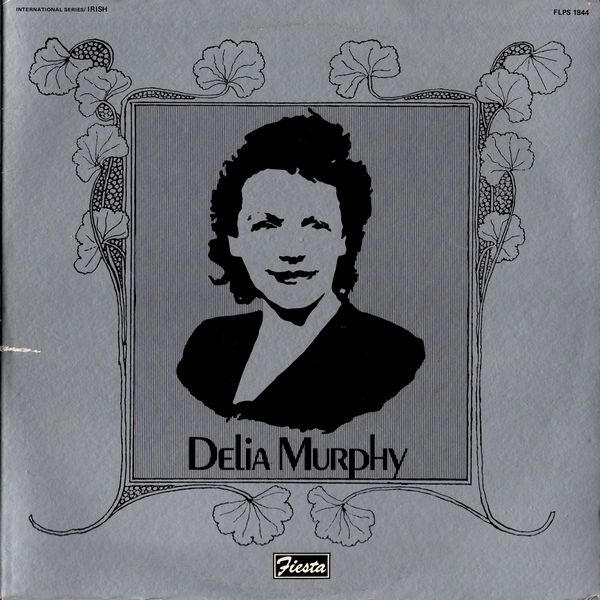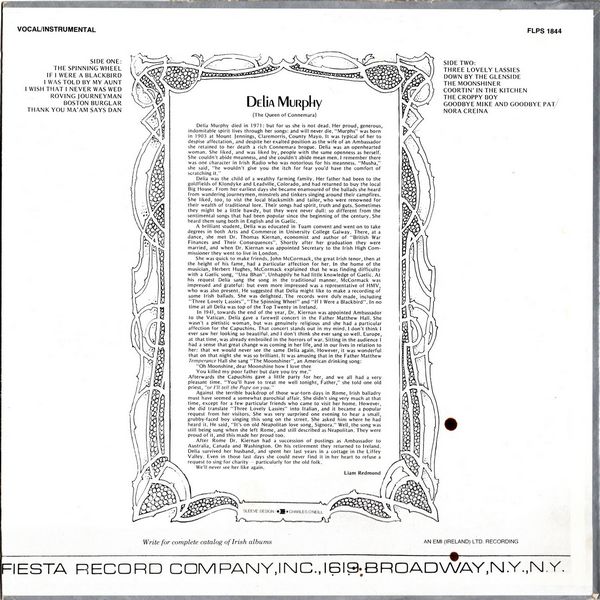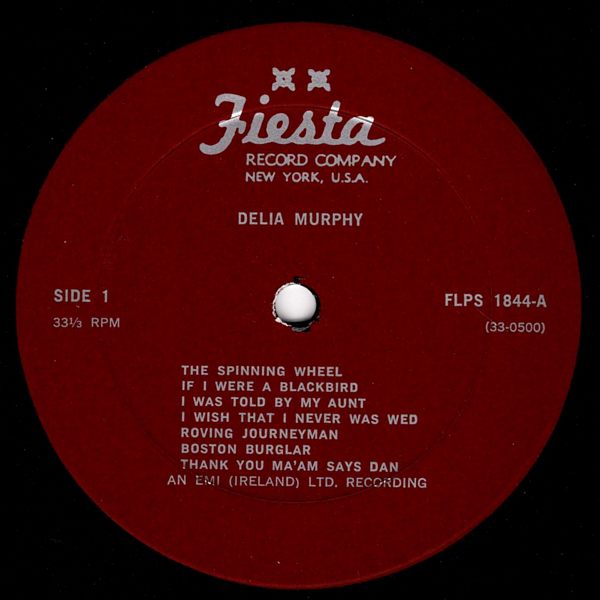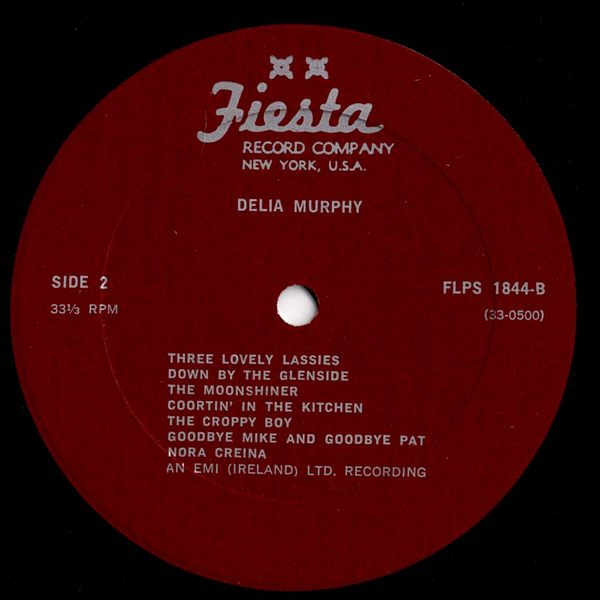
 |



|
Sleeve Notes
Delia Murphy
(The Queen of Connemara)
Delia Murphy died in 1971: but for us she is not dead. Her proud, generous, indomitable spirit lives through her songs: and will never die. "Murphs" was born in 1903 at Mount Jennings, Claremorris, County Mayo. It was typical of her to despise affectation, and despite her exalted position as the wife of an Ambassador she retained to her death a rich Connemara brogue. Delia was an openhearted woman. She liked, and was liked by, people with the same openness as herself. She couldn't abide meanness, and she couldn't abide mean men. I remember there was one character in Irish Radio who was notorious for his meanness. "Musha," she said, "he wouldn't give you the itch for fear you'd have the comfort of scratching it."
Delia was the child of a wealthy farming family. Her father had been to the goldfields of Klondyke and Leadville, Colorado, and had returned to buy the local Big House. From her earliest days she became enamoured of the ballads she heard from wandering journeymen, minstrels and tinkers singing around their campfires. She liked, too, to visit the local blacksmith and tailor, who were renowned for their wealth of traditional lore. Their songs had spirit, truth and guts. Sometimes they might be a little bawdy, but they were never dull: so different from the sentimental songs that had been popular since the beginning of the century. She heard them sung both in English and in Gaelic.
A brilliant student, Delia was educated in Tuam convent and went on to take degrees in both Arts and Commerce in University College Galway. There, at a dance, she met Dr. Thomas Kiernan, economist and author of "British War Finances and Their Consequences". Shortly after her graduation they were married, and when Dr. Kiernan was appointed Secretary to the Irish High Commissioner they went to live in London.
She was quick to make friends. John McCormack, the great Irish tenor, then at the height of his fame, had a particular affection for her. In the home of the musician, Herbert Hughes, McCormack explained that he was finding difficulty with a Gaelic song, "Una Bhan". Unhappily he had little knowledge of Gaelic. At his request Delia sang, the song in the traditional manner. McCormack was impressed and grateful: but even more impressed was a representative of HMV, who was also present. He suggested that Delia might like to make a recording of some Irish ballads. She was delighted. The records were duly made, including "Three Lovely Lassies", "The Spinning Wheel" and "If I Were a Blackbird". In no time at all Delia was top of the Top Twenty in Ireland.
In 1941, towards the end of the year, Dr. Kiernan was appointed Ambassador to the Vatican. Delia gave a farewell concert in the Father Matthew Hall. She wasn't a pietistic woman, but was genuinely religious and she had a particular affection for the Capuchins. That concert stands out in my mind. I don't think I ever saw her looking so beautiful. and I don't think she ever sang so well. Europe, at that time, was already embroiled in the horrors of war. Sitting in the audience I had a sense that great change was coming in her life, and in our lives in relation to her: that we would never see the same Delia again. However, it was wonderful that on that night she was so brilliant. It was amusing that in the Father Matthew Temperance Hall she sang "The Moonshiner", an American drinking song:
"Oh Moonshine, dear Moonshine how I love thee
You killed my poor father but dare you try me."
Afterwards the Capuchins gave a little party for her, and we all had a very pleasant time. "You'll have to treat me well tonight, Father," she told one old priest, "or I'll tell the Pope on you."
Against the terrible backdrop of those war-torn days in Rome, Irish balladry must have seemed a somewhat parochial affair. She didn't sing very much at that time, except for a few particular friends who came to visit her home. However, she did translate "Three Lovely Lassies" into Italian, and it became a popular request from her visitors. She was very surprised one evening to hear a small, grubby-faced boy singing this song on the street. She asked him where he had heard it. He said, "It's on old Neapolitan love song, Signora." Well, the song was still being sung when she left Rome, and still described as Neapolitan. They were proud of it, and this made her proud too.
After Rome Dr. Kiernan had a succession of postings as Ambassador to Australia, Canada and Washington. On his retirement they returned to Ireland. Delia survived her husband, and spent her last years in a cottage in the Liffey Valley. Even in those last days she could never find it in her heart to refuse a request to sing for charity — particularly for the old folk. We'll never see her like again.
Liam Redmond